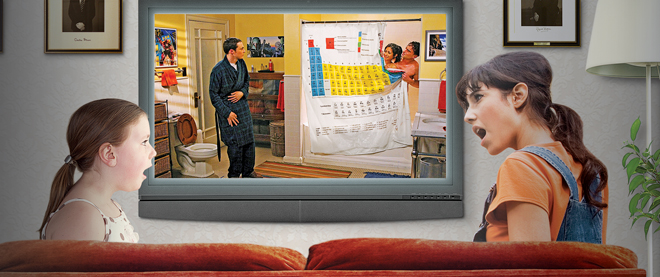They said that on network television?
Sex used to be verboten in prime time. Now it’s all everyone seems to be talking about.
Getty Images; Photo Illustration by Sarah MacKinnon
Share

Rape, multiple simultaneous sexual partners, and penis size: they’re not reality-show or cable topics, they’re the jokes on major network sitcoms. The flop drama The Playboy Club, expected to be the shocking show of the season, turned out to have mild content. But the most popular comedy on TV, Two and a Half Men, is mostly about sex, with references to acts that would make its former star, Charlie Sheen, blush. The biggest new comedy, 2 Broke Girls, includes a character whose only job is to make comments like, “Once you go Ukraine, you will scream with sex pain.” One of the most promising upcoming comedies, about a cool young woman, is trying to go even farther, starting with its title, Don’t Trust the B—- in Apartment 23. Mass-audience TV comedy is no longer the place where people sleep in separate beds.
In the ’00s, after Janet Jackson’s “wardrobe malfunction” at the Super Bowl, there was a panicked crackdown in network censorship, with language and nudity closely scrutinized. But recently, networks have given writers more freedom to talk in scripts the way they talk in real life. Twenty years ago this year, Seinfeld was allowed to do an episode about masturbation only if the word was never used. But Two and a Half Men capped its first Sheen-free episode by giving Jon Cryer the line, “I masturbated and cried myself to sleep.” Taboos about words like “vagina” have fallen so completely that Bill Carter of the New York Times wrote a breathless article proclaiming 2011-12 “the season of the vagina.”
It used to be that if a mainstream show had anything remotely naughty, it would be aired in a later time slot, keeping it away from the so-called “family hour” of the early evening. But to compete with the Internet and DVRs, networks are more willing to air a show like 2 Broke Girls at 8:30 p.m. This has stunned some viewers who expected to be free from orgasm jokes for an hour. “Many parents want to unwind,” says Lee Allport, an online commentator who reacted with shock to 2 Broke Girls’ content on her blog Entertainment ExactLee, “and the thought of their child overhearing quotes such as, ‘Did you flash the bat signal on your vagina?’ can be worrisome.”
But despite occasional complaints to the FCC, the current sex comedies haven’t attracted much viewer outrage. CTV is the Canadian broadcaster for shows like Men, Big Bang Theory and Mike and Molly (which features lines like “men hate it when you sneeze on their weiners”), and Tonia Addison, its senior publicist, told Maclean’s that “there have not been any complaints in the past year” about any of the content.
Some of those shows may even be more popular with traditionalist, socially conservative viewers than the supposed liberal elite. In the ’90s, shows that pushed the boundaries of sexual humour were often the sophisticated comedies, like The Larry Sanders Show.Today, NBC’s well-written, low-rated sitcoms like 30 Rock and Community are among the cleanest comedies on the air, despite the occasional joke like, “I have the weirdest boner.”
Meanwhile, some of today’s hits have given sex jokes a reputation as lowest-common-denominator humour; when The Big Bang Theory opened a season by having a character get his penis stuck in a robotic hand, it was widely seen as a sign that it had become as lowbrow as the same creator’s Two and a Half Men. “Sexual humour has always been a part of television,” Allport says, “but it was usually done subtly or as double entendre.” Today’s TV sex jokes are closer to the ones in movie comedies, used not for subtlety but because they’re easy for the audience to get.
It could be that it makes sense for sex to be the subject of mass-market comedy; in a fragmented era, sex is one of the few things that has universal appeal. Besides, raunchy jokes can give producers a feeling of being edgy, even on shows that aren’t. Michael Patrick King, the creator of 2 Broke Girls, told the Television Critics’ Association that the envelope-pushing jokes give the very traditional sitcom an “irreverent sort of spicy, outrageous, contemporary edge.” And a show that sometimes seems outdated can use all the contemporary edge it can get.